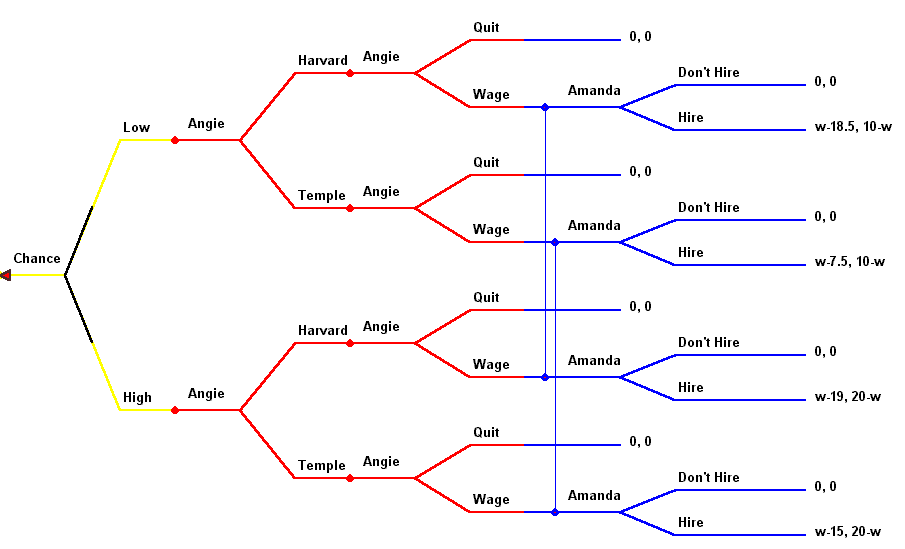
Temple University
Department of Economics
Economics 92, Principles of Microeconomics (Honors)
Homework 12
Trade Negotiations
A Dynamic Game with Incomplete Information
Amanda Reckonwith is the CEO of a large hospital in East Gallstone, Utah. She is planning to hire a new heart surgeon for the staff. The leading candidate is Angie O'Plastie. Amanda's concern is whether or not Angie is of high or low productivity as a surgeon. Amanda only wants to pay Angie a high wage ($20) if Dr. O'Plastie is of high productivity. According to the human resource department, a low productivity surgeon should only be paid $10. These pay rates are based on the premise in microeconomics that a worker is paid the value of her marginal product to the firm. From past experience Amanda Reckonwith knows that only 1/3 of all heart surgeons are high productivity.
The problem is that Amanda cannot be sure of Dr. O'Plastie's productivity. All she can do is see to which school Angie has gone: Harvard or Temple. Amanda knows that going to Harvard for medical school is expensive and difficult. Some low productivity students will get through Harvard in spite of the expense and difficulty. Amanda believes that it will cost low productivity people $11 more to get through Harvard than Temple. She also believes that high productivity people find that the difference in personal cost between Harvard and Temple is only $4. On the other hand, Amanda knows that some high productivity individuals will go to Temple's medical school because it is cheaper and less difficult for them; they can actually have a life besides books and studying. Nonetheless, Amanda has a policy under which she agrees to pay a wage of $20 only if the candidate has been to Harvard.
Working in East Gallstone's cardiac unit is not Angie's only alternative, and Reckonwith is aware of this. If Angie opens her own practice then she can earn 3/4 x value of her marginal product. That is, if she is a high productivity person then she can earn $15 while self employed. If she is a low productivity person then she can earn only earn $7.5 by working for herself.
Angie studied economics as an undergraduate and paid particular attention to the discussions of the market for lemons. With that in mind she applied to both prestigious Ivy League medical schools and less prestigious ones. Knowing that pedigree matters in games of signaling, she may choose to go to the relatively more expensive and more selective Ivy League school. The game being played by Amanda and Angie looks like:

So, Angie knows whether she is low or high productivity. She can choose which school to attend. Upon graduation she can choose to demand a wage w from the hospital in East Gallstone, or quit that job market. If Angie makes her wage demand known to Reckonwith, then Amanda must decide whether or not to hire Dr. O'Plastie. The payoffs are at the ends of the branches. The first entry is Angie O'Plastie's payoff and the second is the payoff for Amanda Reckonwith.